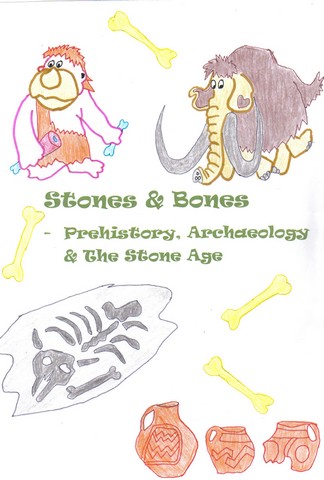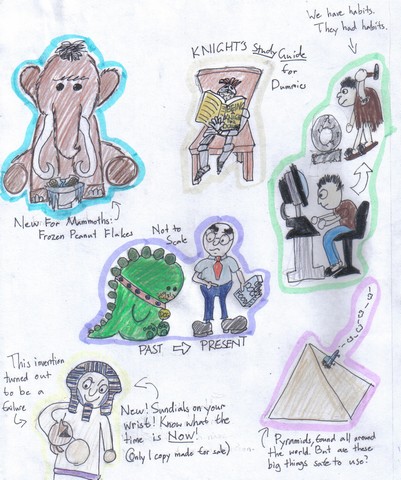Thanks for watching that video yesterday with such concentration. Even though it was hot and sticky, you were like a group of gatherers who had just discovered a plain covered with wild grain, or a band of hunters who had a mammoth on the run.
Eugene and Kyle have already contributed creatively to this blog. Here are the pictures they have drawn.

Kyle’s “Stones and Bones” front cover

Eugene’s front cover
I am most impressed, guys! Anyone else who has artistic or humorous skills, please let me borrow your artwork.
 As you will know from having watched “Stories from the Stone Age”, when some people became farmers and herders, from about 10000BC, their lives changed dramatically.
As you will know from having watched “Stories from the Stone Age”, when some people became farmers and herders, from about 10000BC, their lives changed dramatically.
-
Farming meant that people could settle in one place.
-
They could store food for the future.
-
Larger families were possible and in fact desirable. No longer did people have to carry their young children during long nomadic migrations. Instead, they needed all the labour they could get. Farming is intensive. This would have been the start of child labour! (We do our best to continue this trend at our school.)
-
People could eventually live in much larger groups, leading ultimately to more diverse societies, skills and occupations.
-
Farming could support a far larger population than hunting and gathering, so societies based on farming could grow quickly and become much more complex and varied.
Farming was not necessarily a better way to live; in some ways hunting and gathering in small bands would have been simpler, with fewer possessions, more sharing and less impact on the environment. But once the idea of farming began it spread; the societies that were based on this new way of living grew, prospered, diversified and often became powerful.
Even in the New Stone Age deforestation was an environmental problem in some areas. 

- If you lived in the Stone Age, would you have preferred to be a hunter, a gatherer, a farmer or a herder? Write a comment with your answer at the bottom of this post and give your reasons. Suggest any special skills you have that you might contribute to your group.
After you have written your comment, try this game to gain an appreciation of the tricky decisions that need to be made by archaeologists:
BBC Archaeology Game
One of the changes in the New Stone Age was the domestication of animals. Go to this site for a timeline of animal domestication.
Animal domestication link
- List the first six animals to be domesticated and the approximate date. Then click on your favourite to find out the evidence about when, how and why they were domesticated by humans.
Plants were also domesticated. This means that humans bred the plants for the qualities they most wanted in them. Plants with larger wheat grains were chosen just as goats were chosen for smaller horns. Gradually the domesticated population varied significantly from the wild one.
Table of plant domestication
- Write down four of the important crops and the approximate date of domestication.
Finally, see how many questions from the little quiz below you can nail. There are explanations for each answer, so you can revise by doing this quiz and add to your already considerable knowledge!
Kind regards,
Ms Green / Ros
